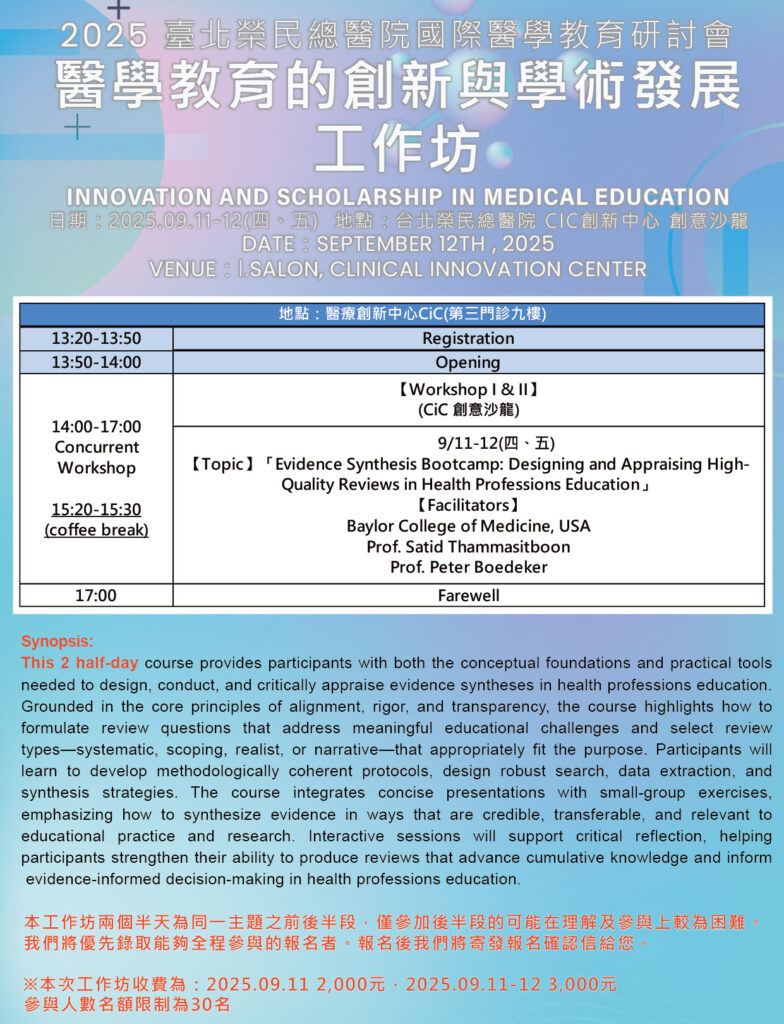2025 臺北榮民總醫院國際醫學教育研討會─醫學教育的創新與學術發展(Innovation and Scholarship in Medical Education)工作坊
工作坊簡介
2025 臺北榮民總醫院國際醫學教育研討會以「醫學教育的創新與學術發展(Innovation and Scholarship in Medical Education)」為主題,誠摯邀請國內外醫學教育領域的專家學者,共同探討最新的教育模式與學術研究成果,期望透過多元的交流與思維激盪,引領我國醫學教育邁向更高層次。
本次很榮幸的,我們邀請到來自美國貝勒醫學院(Baylor College of Medicine)的Satid Thammasitboon與Peter Boedeker教授,兩位教授皆在醫學教育研究、課程設計與教學評量等領域具有豐富的實務經驗與研究成果,希望透過工作坊的形式,讓國外講者與與會者間的互動交流更豐富,以激發更多創新思維與合作動能,為我國醫學教育開啟新的里程碑。
📆工作坊時間:114/9/11 (星期四)14:00-17:00
114/9/12 (星期五)14:00-17:00
📍工作坊地點:臺北榮民總醫院醫療創新中心CiC(第三門診九樓)
11217 臺北市北投區石牌路二段201號
⭐工作坊主題:Evidence Synthesis Bootcamp: Designing and Appraising High-Quality Reviews in Health
Professions Education
⭐工作坊講者:貝勒醫學院(Baylor College of Medicine, USA)
Prof. Satid Thammasitboon
Prof. Peter Boedeker
💰工作坊費用:9月11日 1,200元,9月11日、12日 1,500元(原價2,000~3,000元)
✅凡透過增能計畫報名者,可享有優惠折扣且優先錄取。
✅增能計畫專屬報名連結(即日起至8月27日截止):https://forms.gle/JfNY5rxaMYbTUXD57
✅活動官網:https://reurl.cc/jr35zM
⚠️注意事項:
▲本工作坊兩個半天為同一主題之前後半段,僅參加後半段的可能在理解及參與上較為困難。
我們將優先錄取能夠全程參與的報名者。
▲This is a two-half day workshop, not two workshops with different topics.
The registration of any half of workshop (especially the second half) is not encouraged.
Synopsis
This 2 half-day course provides participants with both the conceptual foundations and practical tools needed to design, conduct, and critically appraise evidence syntheses in health professions education. Grounded in the core principles of alignment, rigor, and transparency, the course highlights how to formulate review questions that address meaningful educational challenges and select review types—systematic, scoping, realist, or narrative—that appropriately fit the purpose. Participants will learn to develop methodologically coherent protocols, design robust search, data extraction, and synthesis strategies. The course integrates concise presentations with small-group exercises, emphasizing how to synthesize evidence in ways that are credible, transferable, and relevant to educational practice and research. Interactive sessions will support critical reflection, helping participants strengthen their ability to produce reviews that advance cumulative knowledge and inform evidence-informed decision-making in health professions education.
Learning objectives:
By the end of this course, participants will be able to:
1. Differentiate between major types of evidence synthesis (systematic, scoping, realist, narrative)
2. Formulate review questions that align with specific educational challenges and stakeholder needs.
3. Design a review protocol that demonstrates alignment between the question, review type, and synthesis plan.
4. Identify common pitfalls in the early design phase that undermine review credibility.
5. Develop structured, reproducible search strategies and selection criteria appropriate to the chosen review type.
6. Apply processes that enhance rigor (e.g., duplicate screening, consensus building, audit trails).
7. Select and justify data synthesis methods that fit the review type (e.g., meta-analysis, thematic synthesis, CMO analysis).
8. Recognize methodological challenges and strategies for addressing them.
9. Describe key elements of transparent reporting and justify methodological choices to support dependability and transferability.
10. Appraise the quality of reviews and primary studies using established criteria.
11. Articulate strategies for enhancing the educational relevance and impact of evidence syntheses.
12. Reflect on how to position their reviews to inform practice, policy, and future research (e.g., knowledge translation, dashboards, living reviews).


